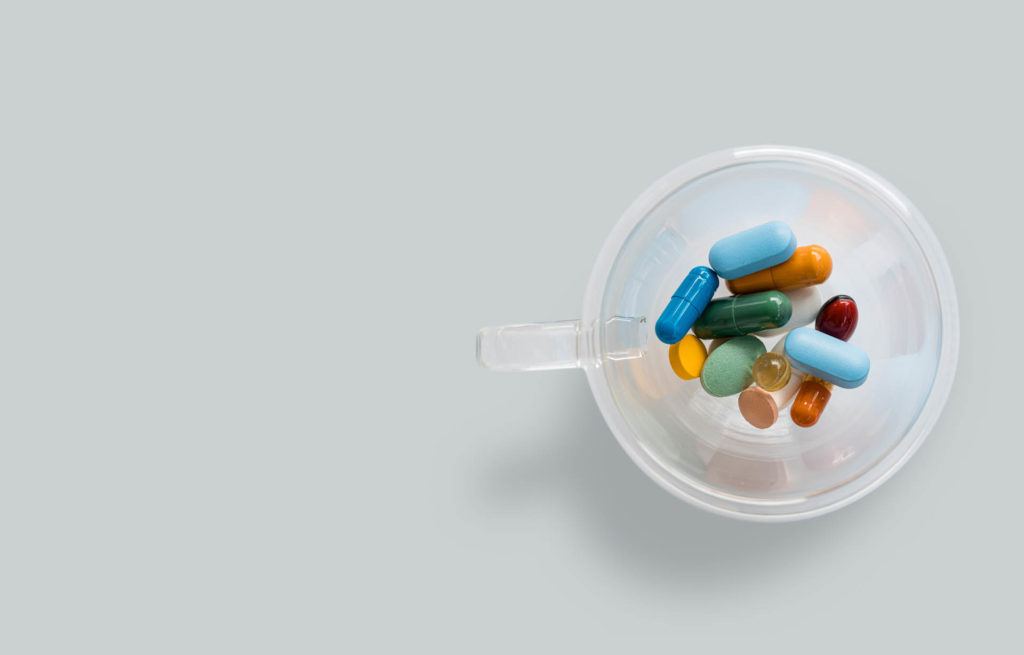Vitamins do not provide calories or create energy. Vitamins can help break down nutrients that yield energy. These nutrients include carbohydrate, protein, and fat.

Most of us have trouble comprehending that vitamins are “supplements, not a cure all.” Try putting tomato soup as fuel in your automobile’s gas tank and then use the best fuel additive in the market and see if that automobile can run properly. Vitamins don’t work if you use them improperly; actually nothing works if used improperly so you must educate yourself on proper usage and realistic expectations. People eat garbage and believe that vitamins will keep them healthy.
Note on Over or “Mega” Dosing
People should not routinely go above the set upper levels for vitamins and minerals. An upper level is not the recommended amount to take. The normal level of vitamin and mineral intake is the maximum amount of a vitamin or mineral that is likely to cause no health risks. Some scientists think not enough is known about mega dosing, or taking extremely high doses of vitamins, to claim that it has health benefits. There is debate if megadose of antioxidants, such as vitamin C, can help decrease the risk for chronic diseases. Much of the current information is conflicting; therefore, more research is needed.
VITAMINS AND MINERALS: WHICH DO WHAT?
We know that Vitamins are essential to good health. For example, supplements like Vitamin A help develop and maintain body tissues, bone and skin, helps vision, nervous system functioning, reproduction, and growth. The B vitamin supplements are key in increasing the production of fats, proteins, and carbohydrates, as well as assisting with metabolism, building red blood cells, and maintaining the protective covering of the nervous system.
Vitamin C supplements help form tissues, cells, bones, teeth, heal wounds and improve the immune system’s performance. Vitamin E supplements protect the outer cell membranes and assisting the immune system in fighting off diseases. Vitamin K helps the body’s clotting in wounded areas.
Mineral supplements also have a broad range of functions. As many as 20 different mineral supplements play significant roles in the body. Supplements called “Micro minerals,” or minerals that the body only needs traces of, can fight off serious illness. These supplements include copper, iodine, chromium, iron, fluorine, tin, zinc, nickel, vanadium, manganese, silicon, molybdenum, and selenium. Minerals that the body needs large amounts of include magnesium, sodium, potassium, chlorine, phosphorus, calcium, and sulfur.
Only when extreme amounts of these vitamins are taken, do toxic levels become present in the body.

The supplement zinc is responsible for helping metabolize proteins and keep enzymes functioning. Copper is needed by enzymes for metabolizing. Iodine supplements assist the thyroid gland in working properly. Calcium and phosphorus build bones and teeth. Iron delivers oxygen to the body’s cells. Potassium aids muscle contraction, maintains the fluid balance of cells, helps transmit messages through the body’s nerves, and even keeps the kidneys and heart working correctly.
How these supplements interrelate. Vitamins and minerals not only help the body function, but they work to strengthen each other. The body absorbs iron through the help of vitamin C. Vitamin D helps the body absorb phosphorus and calcium. Vitamins D and K are the only vitamins the body can supply for itself. The skin creates vitamin D when it’s exposed to sunlight. Vitamin K is produced by intestinal bacteria. Supplemental sources must supply the body with all the other vitamins.
Vitamins are divided into two categories by the substance that carries them throughout the body.
- Water-Soluble Vitamins are carried and stored all through the body by water. These vitamins need daily replacement because they are expelled in body fluids like sweat and urine. Water-soluble vitamins include folacin (folic acid), biotin, pantothenic acid, thiamin (B1), riboflavin (B2), niacin (B3), pyridoxine (B6), and cyanocobalamin (B12).
- – These vitamins, like A (retinol), D (calciferol), E (d-alpha-tocopherol), and K (menaquinone), are carried by fats located in the bloodstream. Since fat stores better than water, it’s less critical when the intake of these vitamins is interrupted, than when water-soluble vitamin intake is interrupted. Only when extreme amounts of these vitamins are taken, do toxic levels become present in the body.
Be aware of the supplementation needs of your body and the proper way to take those supplements as well as the consistency needed to make them work properly for you.
©Copyright – Hector Sectzer

















